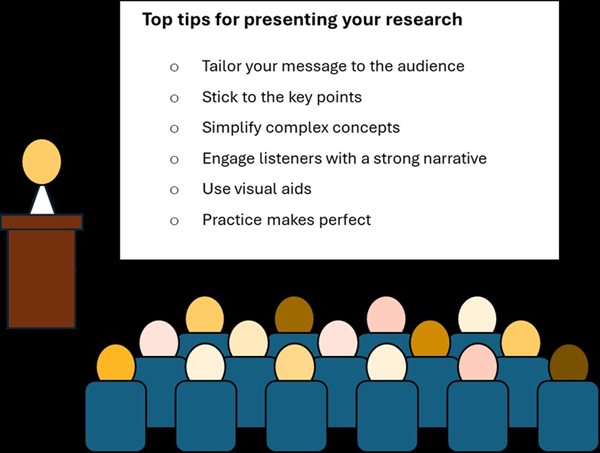Effective communication goes beyond the scientific intricacies of pharmacology; it involves understanding your audience, weaving a compelling narrative, and meticulous preparation. As Mary Poppins said, “a spoonful of sugar helps the medicine go down", so in this article we outline five key strategies to make your research more palatable to your peers and elevate your insights from the confines of the lab to the forefront of your field.
Know your audience. Understanding your audience allows you to tailor the terminology and tools you use to communicate your science. The interests and background knowledge of your audience will vary depending on their field of study. Adapt your presentation accordingly - consider what the audience needs to know to comprehend and engage with your research. If your audience is comprised of researchers in your field, it may be appropriate to dive straight in to complex and specific topics with only a brief introduction. However, for broader audiences you may need to spend more time explaining core concepts before delving into your research. This is particularly important if your research involves novel research techniques, or is centered within a niche area, such as rare diseases.
Tell a story. Everyone loves a good story, even pharmacologists. A strong narrative arc will captivate listeners, so structure your presentation with a distinct beginning, middle, and end. Kick things off by clearly articulating your research question and aims, as this will set the scene for you to describe your methods and findings and help the audience to understand how your research will progress the story. All good stories have a satisfying conclusion so be sure to end on a high - this is your chance to really have an impact by revisiting your research question and explaining the lessons learned, or in other words, what your research adds to the field. A successful presentation will compel your audience to discover more about your research and may even change their way of thinking.
Prepare accordingly. Practice your presentation with colleagues/peers as many times as needed to feel confident without notes. Use these opportunities to receive constructive criticism and improve. Consider the size of your text and figures on the slides. Are these big enough to be seen from the back of the lecture theatre? Think about any gaps in your research and how you might answer any questions that may arise. Don’t worry if you are asked a question and do not know the answer. It is perfectly acceptable to explain that you are not certain but will find out and get back to the questioner. Finally, remember that no one else in that room knows your research better than you. You are the expert! Try to relax and enjoy sharing the results of your hard work.
Keep time on your side. Ensuring you can deliver your talk within the allocated time should be a key part of your preparation. Adhering to time constraints is not only crucial for the schedule, but also maintains audience engagement. Maximise your impact by employing concise language, focusing on essential points, and steering clear of tangents. While it's natural to speak a bit faster when nervous, maintain a pace that your audience can easily follow. Remember, a picture is worth a thousand words and visual aids are a great way to enhance audience understanding without disrupting the pace of your presentation. Pay attention to the previous speakers and adjust accordingly. If a topic has already been covered in depth, acknowledge it, but don’t repeat in detail. At the same time, if you are the first speaker, it’s your job to set the scene. Keep in mind that even the most experienced speakers can lose track of their timing, so don’t panic and be prepared to adapt if the session chair signals that you are running short of time.
Be aware of your environment. Communication with your audience can be enhanced or inhibited depending on how you use your surroundings. For example, in a large lecture theatre many speakers stand behind a lectern far away from the audience. While this physical barrier may seem comforting to a nervous speaker it can be detrimental to audience engagement, for example, by enabling total reliance on notes/slides, inhibiting natural body language and (worse) leaning on the podium. While it may not be possible in all circumstances, for example if a microphone is not available, consciously choosing to stand closer to the audience will result in a more engaging presentation. Do not be afraid to move around the stage, especially during the post-talk question and answer session, as this facilitates eye contact and direct interaction with the questioner and reduces the likelihood of mishearing.
Mastering the science of effective communication is not merely about delivering the results of your research; it’s about creating lasting impact. A dash of precision, a pinch of preparation, and a generous helping of engaging storytelling will make your pharmacological insights not only digestible, but will ensure they resonate with your peers.

Comments
If you are a British Pharmacological Society member, please
sign in to post comments.